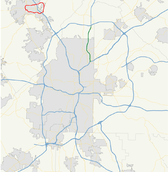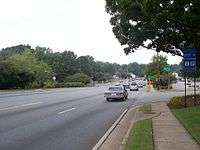Marietta Parkway
| |
|---|---|
| Route information | |
| Alternate route of SR 120 | |
| Maintained by GDOT | |
| Major junctions | |
| West end: |
|
| East end: |
|
| Highway system | |
| |
North and South Marietta Parkway form a ring road in Marietta, Georgia that was once designated as Georgia State Route 120 Loop before route realignments in 2007. The full loop is approximately 9 miles (14.5 km) in circumference and intersects Interstate 75 twice, once on the north side of Marietta and once on the south side. The southern segment of the road is designated as a part of Georgia State Route 120 and the northern segment forms State Route 120 Alternate.[1]
A portion of SR 5 overlaps SR 120 Alternate from U.S. Route 41 west to SR 120 mainline.
History
| |
|---|---|
 | |
| Route information | |
| Loop route of SR 120 | |
| Maintained by GDOT | |
| Length: | 9.0 mi[2] (14.5 km) |
| Major junctions | |
| Beltway around Marietta | |
| Highway system | |
| |
Georgia 120 Loop was built over an approximately 20-year span from 1967 to 1989. The first sections complete and open to traffic extended east of U.S. Route 41 and included the interchanges with then-new I-75, and with mainline Georgia 120. While the northern part went through what is still farmland as of December 2007, the southern part went right through existing neighborhoods, destroying several homes and cutting-off several streets, much like I-75 had just done.
Initially, mainline Georgia 120 followed what is now the northern part of the loop between Roswell Road and U.S. 41: a move that resulted in the removal of the portion of Georgia 120 from U.S. Route 41 at the Big Chicken to the eastern 120 Loop interchange. This was changed in the early 1970s to the configuration still known to locals today. The northern portion of the Loop is distinct in that it ended at a partial diamond interchange at U.S. Route 41 (then Georgia 3E, now Georgia 3), with the roadway built-up for a future full interchange.
Work did not commence again on the remainder of the highway until the late 1970s. Work to upgrade Clay Street from U.S. Route 41 to Powder Springs Street (Georgia 360) included a relocation of part of the street to an underpass beneath the Louisville & Nashville (now CSX Transportation, originally Western & Atlantic) Railroad. When work was completed, it finished the southern half of the route and the highway was extended. Clay Street would later be renamed South Marietta Parkway with exception to Old Clay Street, which remains as a residential street connecting the Loop to Atlanta Street (SR 5). Northwest of Manget Street, the highway went diagonally through existing neighborhoods, again destroying several homes. Atlanta Street was severed, but Atlanta Road was built next to it on its west side, taking more homes. Part of Powder Springs Street was permanently torn out, leaving the rest of it north to the town square as Old Powder Springs Street. The relocated Powder Springs Street was angled off to the west to become the western section of the Loop, and was extended north just past Whitlock Avenue to Polk Street.

Work began again in the early 1980s to complete most of the northern quadrant when the roadway was extended from the previously-mentioned diamond interchange to connect to and take over Page Street. The planned overpass of U.S. 41 was never built and an at-grade intersection was put there instead. However, the ramps still curiously remain, with the southern (eastbound) one actually used as an entrance ramp, and the northern (westbound) one connecting to Barnes Mill Road instead. Page Street had previously ended at Fairground Street, and the extension completed all parts of the loop except one final part.
1989 saw completion of the final leg of the loop at its northwestern corner, going west past Church Street (by then a one-way street which at the time was SR 5 southbound). This portion took out the lumberyard of Williams Brothers Lumber Company, and involved building an entrenched roadway with an overpass for Kennesaw Avenue (the original U.S. 41 and SR 3) and the L&N Railroad, with the roadway tying into the extension of the new Powder Springs Street, which previously ended at Polk Street. The completion of this final leg resulted in the completion of the loop. In addition, SR 5 was relocated out of downtown Marietta onto part of the new loop to the west; it was later rerouted through a completely different city, going down Austell Road instead of Powder Springs Road, and may be rerouted yet again off of the loop and completely away from Marietta onto Barrett Parkway.
In October 2007, the portion of SR 120 along Roswell Street between U.S. 41 and SR 5 and 120 Loop was downgraded to a local city street, along with portions of SR 5. Since SR 120 required a new routing, Georgia 120 mainline was moved to the southern part of SR 120 Loop, and SR 120 Alternate was created on the north loop. As a result, Georgia 120 Loop no longer exists, though as of December 2007 only some of the signs have been changed, leaving a hodgepodge of confusing and contradictory information in different places, in addition to there being no public notice of the change by the Georgia Department of Transportation. Compared to the northern route, the new routing takes mainline SR 120 around Marietta the indirect way, making it a longer distance by going out of the way to the south and back north, causing drivers to turn on a different road to stay on the same highway at a third point at Powder Springs Road (in addition to either end where it turns off to original route), and causing further driving delays with more traffic lights. In January 2008, Georgia Department of Transportation (GDOT) crews began discreetly changing and removing signs along the 120 Loop and the 120 mainline.
The remaining state-maintained part of Roswell Road between the eastern intersection with the loop and U.S. 41 was renumbered Georgia 3 Connector, the previous designation of a completely different road in Marietta. Georgia 5 currently shares the west end of the Loop, west from Cherokee Street (northbound only) to Church Street (southbound only), southwest to Whitlock Avenue, south to Powder Springs Road, and turning east at that intersection to Atlanta Road. This is a completely roundabout and unnecessary routing, since Atlanta Road turns into Cherokee Street via East Park Square (the street's name for one block along the town square), and since Church Street / West Park Square / Old Powder Springs Street connects to it at a one-way cross street.
Names
Along the north side from Whitlock Avenue (where Georgia 120 continues west, becoming Dallas Highway), northeast to Church Street, east to Roswell Road, and southeast to Lower Roswell Road, it is known as North Marietta Parkway. Much of this route used to be known as Page Street. Almost all of it is in the county's northeast quadrant for street addresses, except west of Church Street where it is northwest.
Along the west side from Whitlock Avenue south to the "new" Powder Springs Street, then east to Atlanta Road, southeast to Manget Street, east to Interstate 75, then northeast to Lower Roswell Road, it is known as South Marietta Parkway. Much of this route used to be known as Clay Street. Almost all of it is in the county's southeast quadrant for street addresses, except west of the railroad tracks where it is southwest.
Purpose
Its main purpose is as a bypass route around the central business district of Marietta, like most loop roads. However, it is also a common surface street for locals. The two main intersections with Interstate 75 in Marietta are along this road in the eastern part of Marietta.
Major intersections
Traveling south from Church St. to Powder Springs St:
- Whitlock Avenue (Georgia 120 towards Dallas)
- Powder Springs St. (Georgia 360 towards Powder Springs)
Traveling east from Powder Springs St:
- Atlanta Street (Georgia 5 towards Austell)
- Cobb Parkway (U.S. 41 towards Smyrna)
- Interstate 75 (I-75 towards Atlanta)
Traveling north from I-75 (divided highway):
- Powers Ferry Road (towards Sandy Springs)
- Lower Roswell Road (towards Roswell)
- Roswell Road (Georgia 120 towards Roswell)
Traveling west from Roswell Road:
- Interstate 75 (I-75 towards Chattanooga)
- Cobb Parkway (U.S. 41 towards Kennesaw)
- Cherokee Street (Georgia 5 northbound towards Woodstock and Canton)
- Church Street (Georgia 5 southbound from Woodstock and Canton)
References
- ↑ "Revisions to the State Highway System in Cobb County" (PDF). Georgia Department of Transportation. January 29, 2007.
- ↑ Archived June 15, 2007, at the Wayback Machine.

